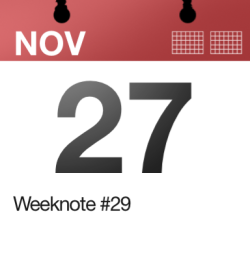JISC Innovating e-Learning 2010 Online Conference – #jiscel10
This was my first foray into the world of online conferences and, overall, I think it was facilitated well: I was able to pick and choose the sessions I was interested in and schedule my regular work around it. On the other hand, with an online conference you don't tend to get to 'meet' new people. Or at least I didn't – I tended to pay attention to, and talk to, those I already knew.
I attended the following sessions:- Learning to live in interesting times – what are educational institutions for? Keri Facer (Manchester Metropolitan University)
- Developing a culture of blended learning innovation Graham Galbraith (University of Hertfordshire) and Jon Alltree (University of Hertfordshire)
- How to get your innovations adopted (and change the world) Anne Miller (The Creativity Partnership)
- Is the future mobile? Graham Brown-Martin (Learning Without Frontiers)
Keri Facer's opening keynote was excellent (and very well facilitated by Helen Beetham). It was thoughtful, provocative in places and participative; a really very well-chosen start to the conference. Likewise, Anne Miller's session on innovation employed techniques showing us that we only notice what we're already paying attention to, and referenced many useful studies. Her book, How to Get Your Ideas Adopted: (And change the world) looks marvellous. I've added it to my Amazon wishlist just in time for Christmas. 🙂
Graham Brown-Martin's session was provocative and included many, many links to go back to. He showed effectively that of course the future is mobile – in fact, to a great extent, the present is mobile! I wasn't keen, however, on Graham Galbraith and Jon Alltree's session as I didn't think it really lived up to its billing. It may be just my prejudices, but (as I posted in the discussion area afterwards) I feel you have to define – or at least probe – what you mean and others mean by 'innovation' (as Anne Miller did). It felt like an advert for the University of Hertfordshire most of the time. Whilst I'm sure they're doing great work these things need to go above and beyond. I started the following sessions but bailed out due to finding the speakers boring and/or disagreeable. That, I suppose, is one of the benefits of an online conference – the ease with which you can come and go:- Transforming assessment for learning in a digital age David Boud (University of Technology, Sydney)
- What do students really want? Usman Ali (NUS)
- Shaping our learning futures Elliott Masie (the Masie Center) shares his thoughts on this with the conference.
To my mind, online conferences will never replace all face-to-face conferences, but they can certainly augment them. I liked the way that Elluminate made it almost expected that there would be audience participation through the text chat and the voting mechanisms. That's something that you don't usually get at offline conferences.
What would I like to see next year?- Improvements in Elluminate so that messages in the text chat appear (if you want them to) on Twitter and vice-versa.
- A focus on the UK – the two speakers I heard from outside the UK were poor, to my mind, and symbolically it's better to celebrate what's going on here.
- Some other software running the back end of the conference – for example the Crowdvine, used at the ALT-C conference was a lot more intuitive, open and sociable.
What do I think needs to stay?
- The solid introductions by facilitators, showing participants how to engage using Elluminate.
- Timings of the session were, by and large, spot-on for my needs at least.
- Bringing in provocateurs and people outside the establishment to mix things up a bit.


 This week I have been mostly…
This week I have been mostly…